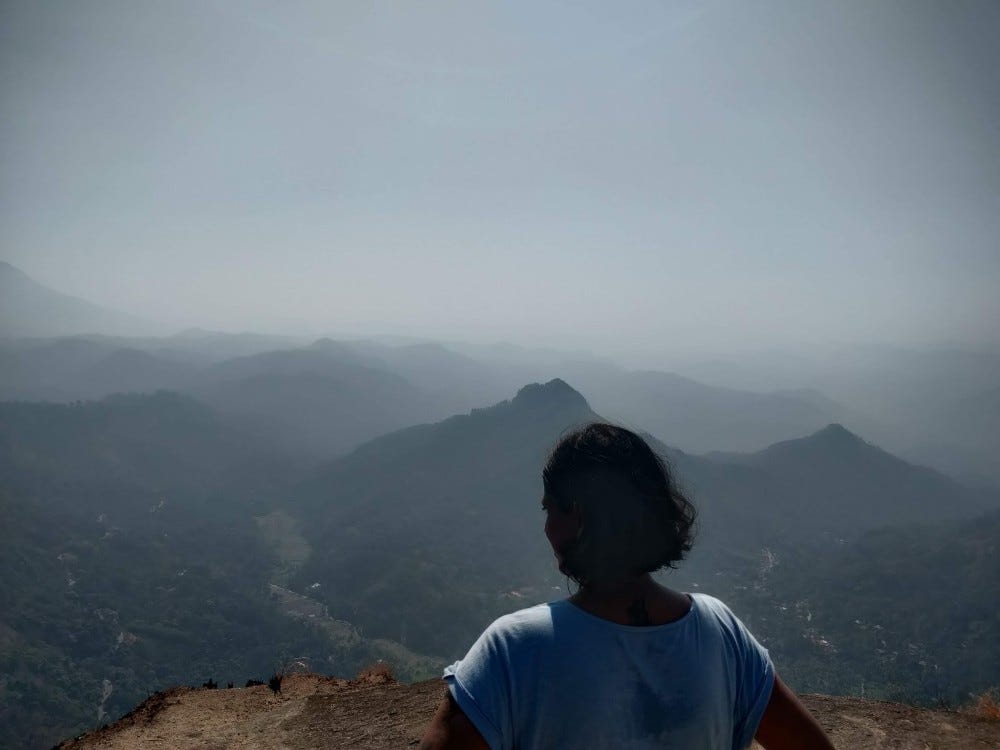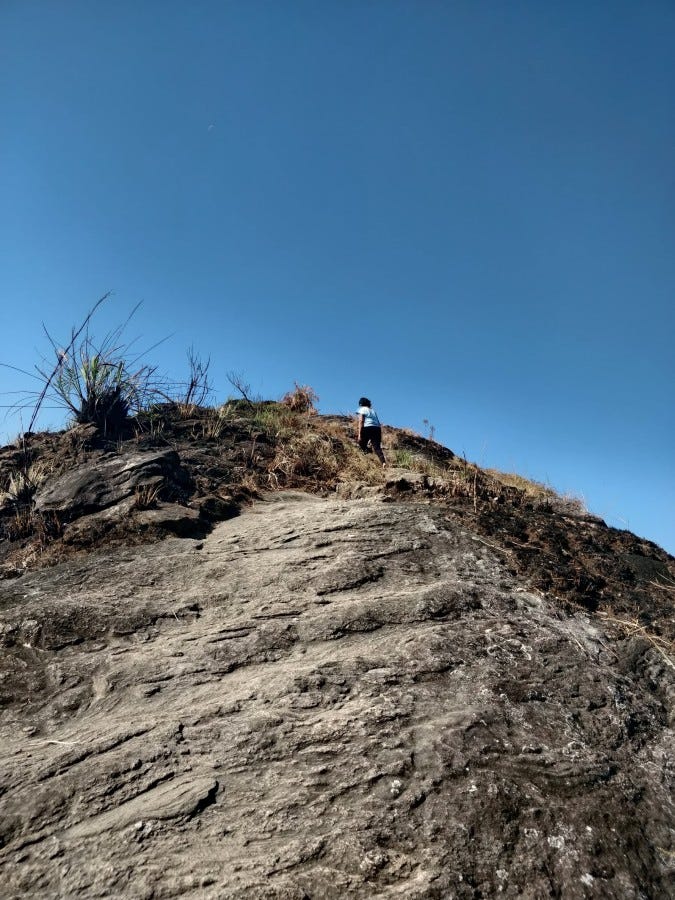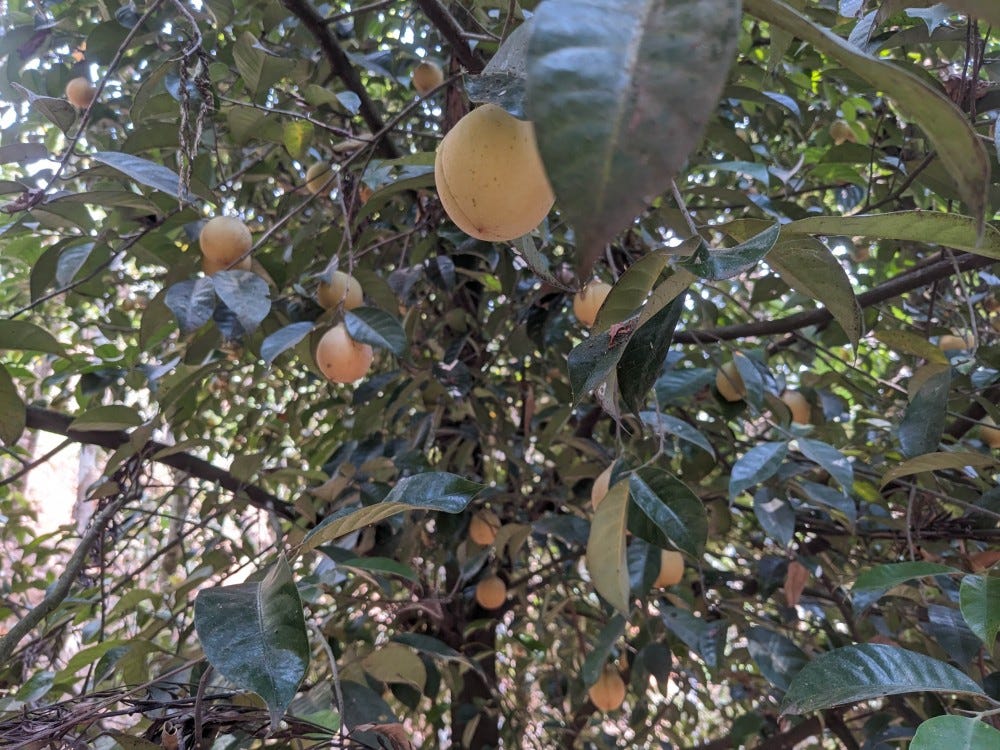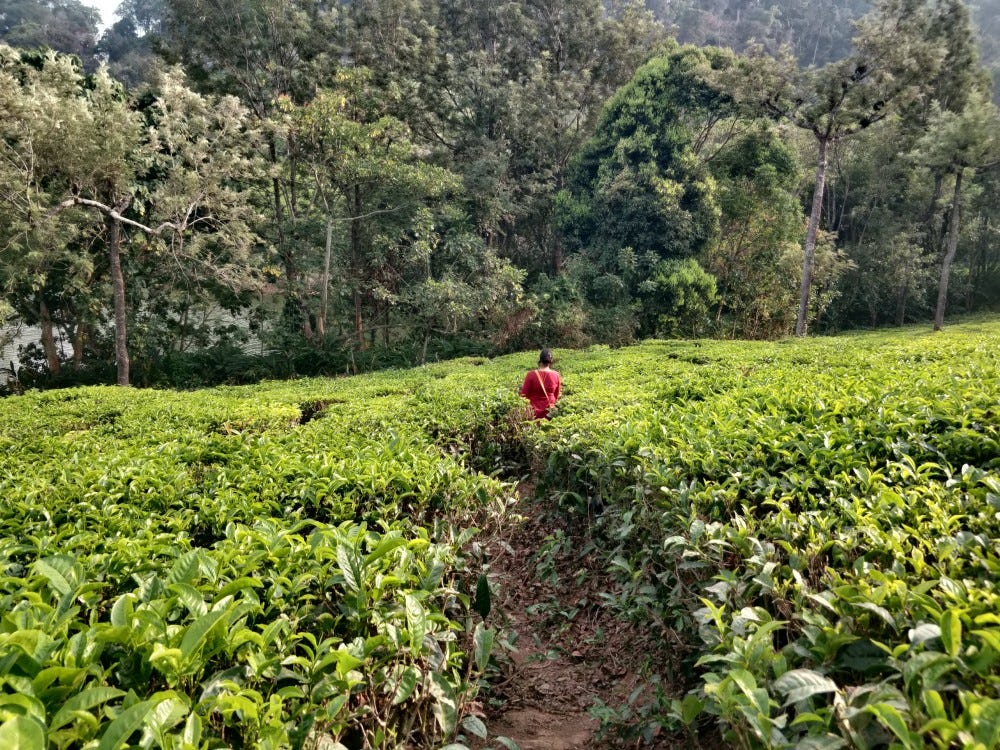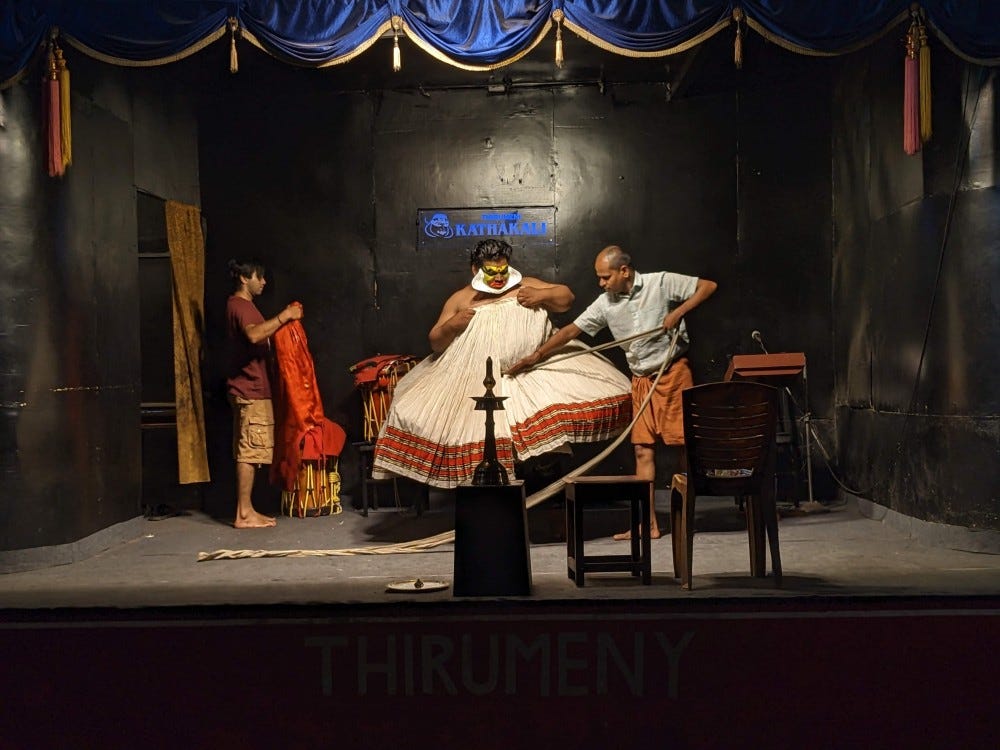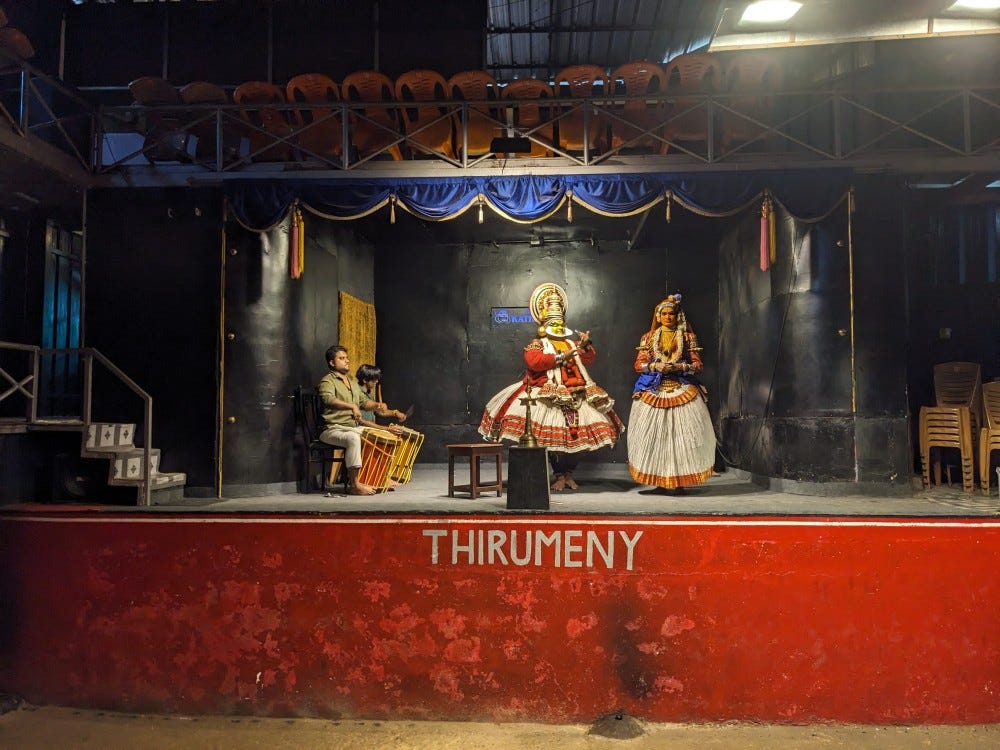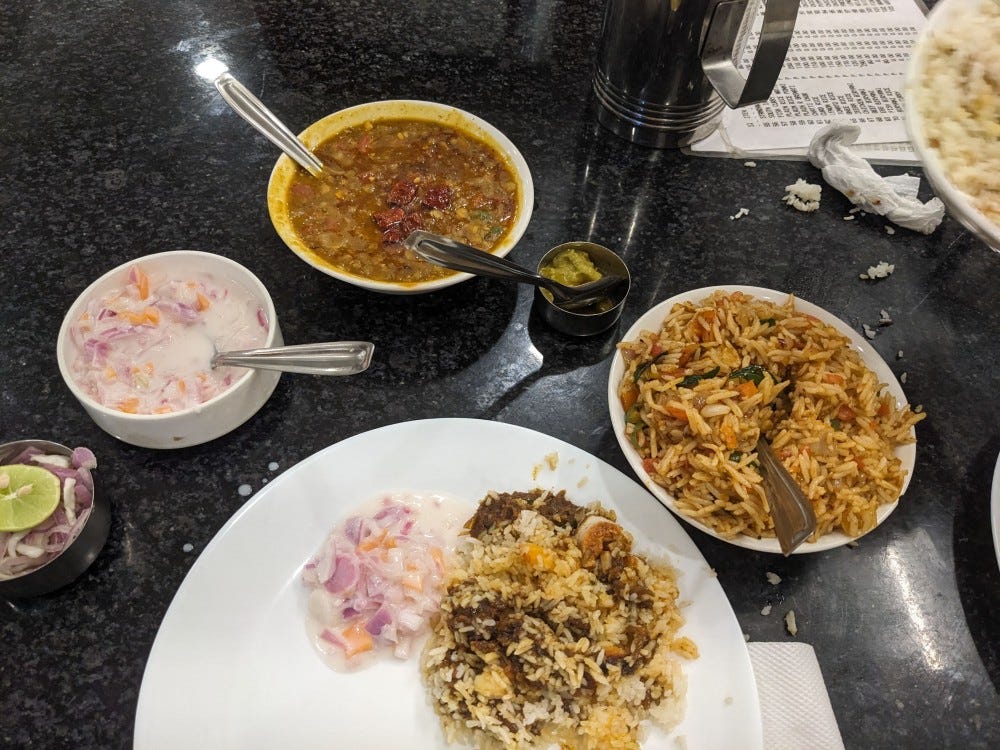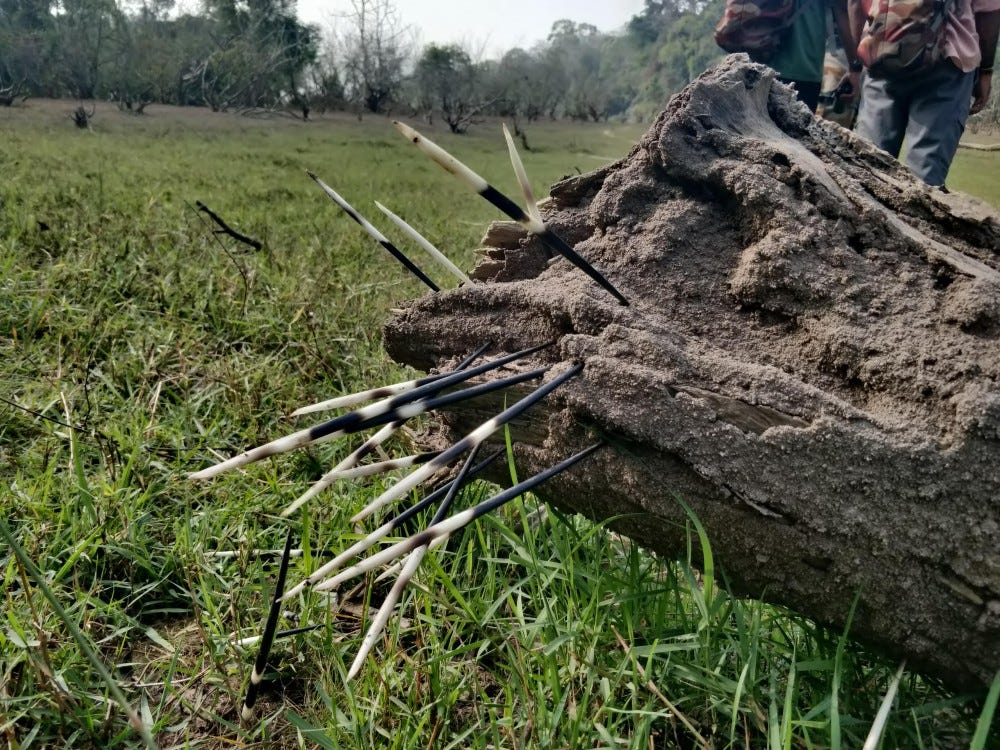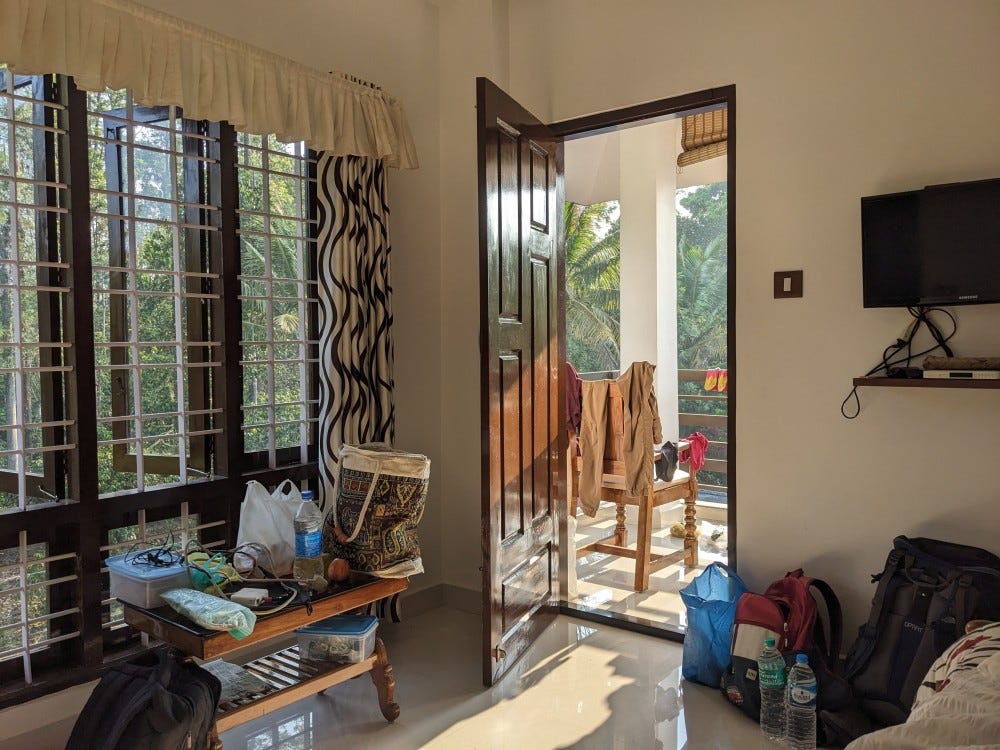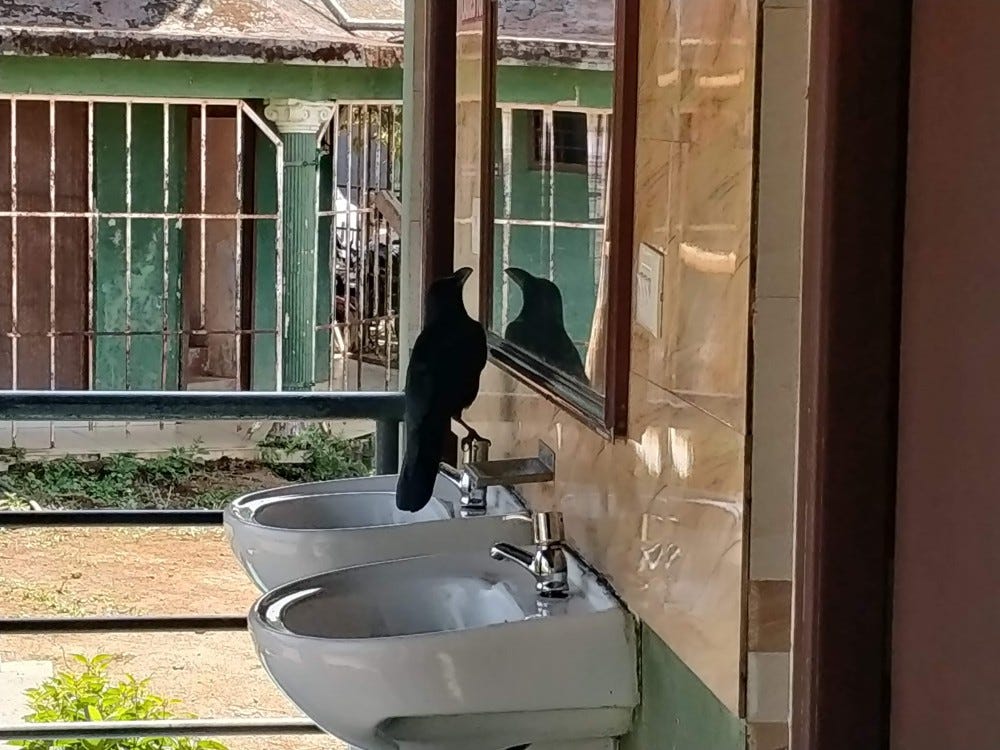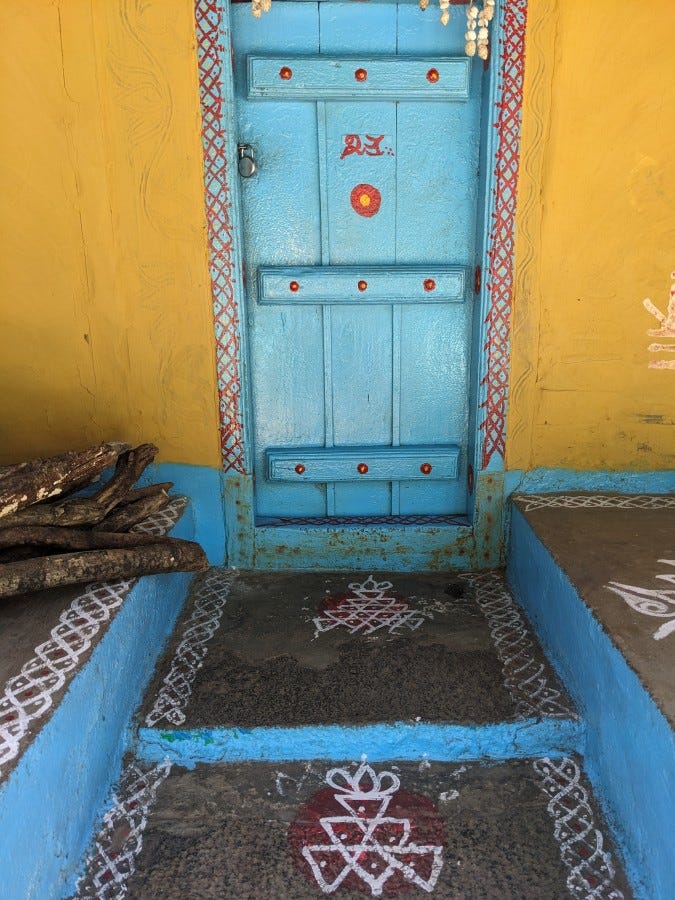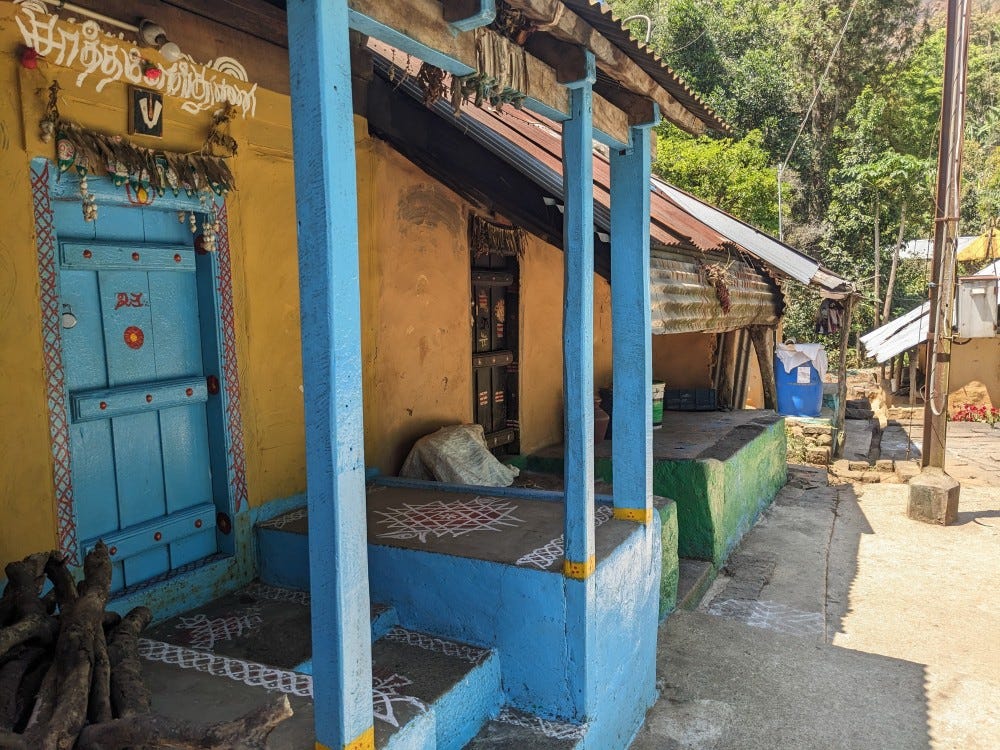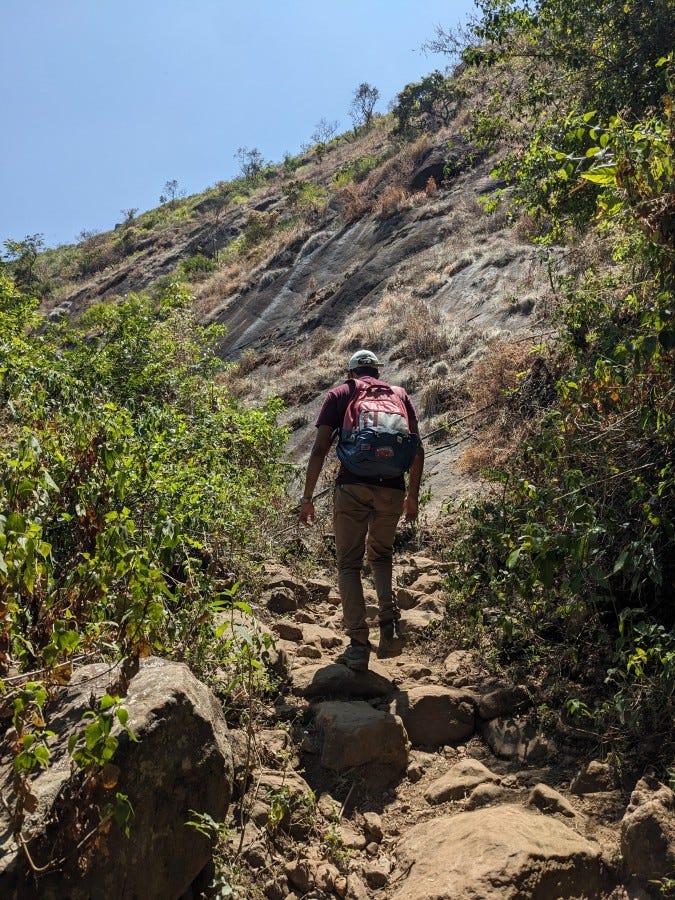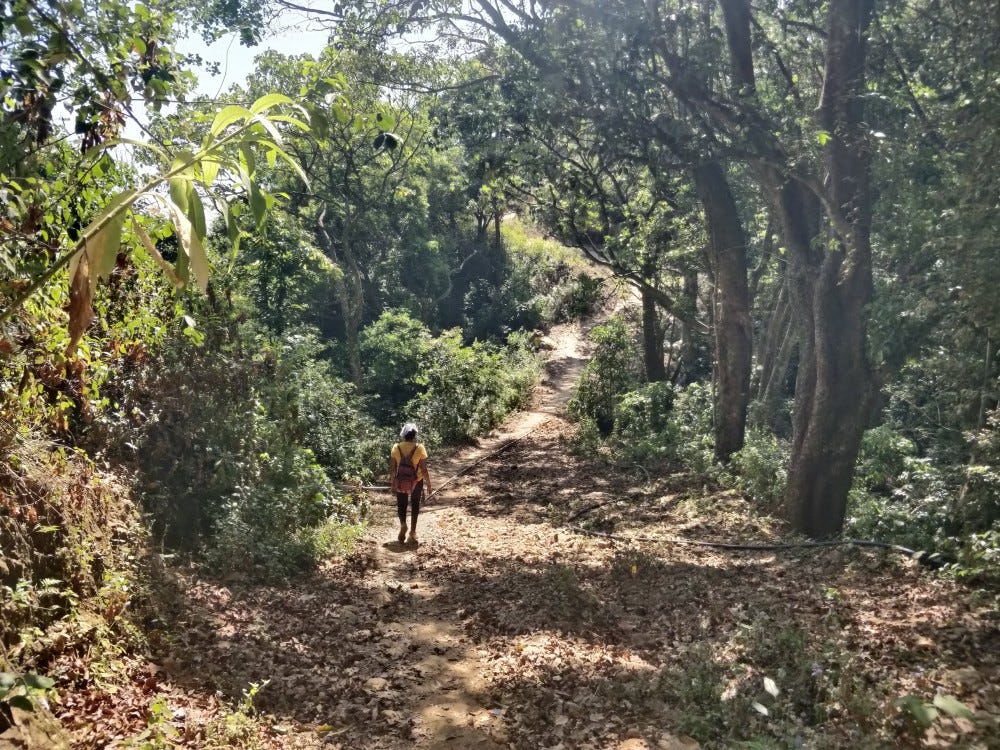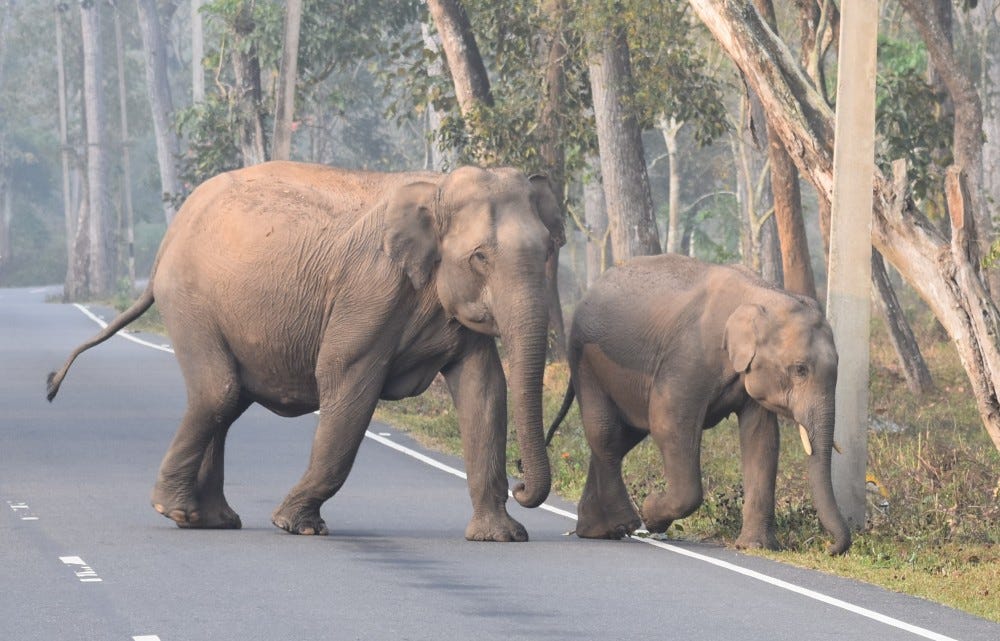bouquet on a wall
south Indian forests, local spices, baby elephants, day by day, wildlife and whiskey in Wayanad, and peace of mind
Dear Reader,
Thank you for joining me. I hope your week is colorful.
In the last newsletter, I had given the account of showing my parents around Kerala, the Indian state my partner and I had been discovering and where I had invited them to visit us. Since then, I have traveled to many new places in Kerala.
When my parents left, we headed to the mountains, hoping to find cooler climate. Kerala was roasting us alive. No hard feelings.
Even in the mountains, we didn’t get respite. Though the nights were cool, the days were hot. At heights, the sun was unrelenting. After 10 am, we couldn’t walk outside or hike or do anything else remotely outdoors. Unless, of course, we just did all those things anyways.
On some days, we were brave. We started out for a trek at 6:30 am, aware that we would only be back home by 11:30 or so. At the crest of the mountain, everything was below us. The world was open like a book for us to see.
I had taken off my shoes to climb a rock. Believe it or not, sometimes when I am unsure of a path, I trust only my bare feet. Not even my new shoes of Merrell, a company I trust for making outdoor shoe for any terrain, weather, or sole could make me feel secure. My partner had refused to go beyond a point. He stayed behind. Like the many locals of many places in India, I climbed rocks and ran up muddy trails barefoot. The sun was right above my head. Going up was not so bad. But when I went down to get him—“hey, you should really see this view, and the trail isn’t so bad”—my feet burnt on the scorching rocks and roasted dust. Again, while descending, the mountain was so hot, I was sure my naked feet would have blisters at the end of the trek.
I didn’t get blisters but I couldn’t walk slowly and had to run down.
We did many other things in the mountains.
My partner and I drove an hour and a half to see wild elephants. The news was that a large group of elephants come out to the water stream every day post four pm. The group of adults and baby elephants did walk out of the forest at 6 pm. We had been waiting across the river for two hours and watched them for another hour.
Having the wild elephants in front of us bathing, drinking water, playing, eating, pushing each other with their trunks was worth all the effort.
In the following days, we saw Kathakali: a classical dance of Kerala, ate local chocolates, explored spice farms with our host, made food in our homestay kitchen, ate local meals with the host family, went to a lake nestled amidst a large tea estate, and stole cardamom, pepper, and nutmeg from local spice estates when no one was watching us. To be fair, we didn’t pluck as much nutmeg as we picked up the fallen seeds from under the fruiting tree. But yes, cardamom and pepper we took from the plants and the vines, a little from many different plantations, hoping no one would care to lose a tiny bit of their produce.
Why did we steal? Just for the thrill of plucking our own spices, directly from the plants. To have our little adventure.
So that is about the mountains.
Beyond the peaks, we went to a national park. We thought the park wouldn’t be so hot. But during the day, it was blazing outside. My partner and I rested, walked the town which was the gateway to the park, did a day-long rafting and trekking program in the forest where we saw many wild elephants along with new-born babies, went for a boat ride, ate local fish meals, and so on. It was all amazing and all out of this world.
Of course, the every day issues of finding a good place to stay, having the host provide us the basic necessities and privacy, arranging food, not being ripped off by local sellers when we tried to buy fruits and eatables, saving the spices drying in the sun on the balcony from monkeys, and getting around were also there. Though in most cities and towns in Kerala, locals were kind and costs were the same for tourists, only in this park town we found the prices to be surged up for outsiders. The park is popular and is visited by a tonne of tourists all the time.
Those are the things that make travel tiring. We struggled enough, we enjoyed enough, and then we left the national park.
In between, we went to a mountain town which shouldn’t have been popular. The place had nothing. It was just at a height, still scorching, and mentioned places such as “Meadows” and “pine forest” to see. These places were—literally—marked with these labels. Have you ever seen a board outside meadows saying “Meadows?” This town did. It was a mountain destination that had become popular with locals, perhaps because during some months it offers a cooler climate than most other places in the state. And because the destination was now a destination, “points of attraction” had been created to save the town shame from travelers.
We didn’t do anything there. When we reached, we ate dinner and slept off early. The next morning, we had breakfast. The meadows opened at 9 am—a fact I couldn’t understand, so by the time we went to see them, they were as sunny as you can expect meadows to be. My partner—who was the one who had discovered that town, reminded me a hundred times that we have to go there, and planned the whole trip—went to the meadows and returned within fifteen minutes. A little bit of “I told you so” followed when he came back to me.
Then we drove to this real, cool mountain city in Tamil Nadu where we have been for the past five days.
Here, in this hill station, the temperature is finally good. It is cold enough that at night I almost froze while sitting outside on the terrace to write. Only after suffering for three days trying to stay warm but unwilling to go inside the room, I have learnt the lesson to stay in after the sunset.
We have been lucky to find a tiny room on a large roof. The view is of the surrounding mountains and homes and leafless pear trees, the terrace is mostly private unless the caretaker decides otherwise, stars beam down upon us all night, it’s really good to sit in the sun in the open and have tea or coffee, the spices are finally drying all-day in the sun, and wild bisons walk the streets and through the long wild grass around the house. Amidst so much that is good, I try to ignore that the staff doesn’t want to do a thing and only want payment every day without fail.
We have explored the mountainous town, went up and down its streets, walked by the man-made lake in the center of the town, bought local cheese and coffee, and also went for a day-long hike to a village which still doesn’t have a road. The villager who welcomed us into his home and offered steaming cups of home-grown coffee said the government asks them to wait a month, then another month, and so on about the matter of the road.
Only hundred or so people live in that village. Their children stay in the village upto the sixth standard. Then the little ones go to nearby towns to study and live in hostels. That’s the story.
Do you grow anything here? Sitting on the stone stairs leading to the house door, I asked the kind villager and his old mother.
“Avocado, cardamom, jackfruit, coffee, a little pepper,” He replied.
That’s much about the life there. The village ended before it began. My partner and I ate our picnic of cheese and tomato sandwiches in the forest where many of the village men and women were cutting wood to take home. They must cook with firewood as getting gas cylinders would be tough. After all, the families still walk to nearby towns to get groceries and other essentials once a week. The walk up to the market is three hours—all straight up about 3000 feet—and the descent down to the village is two hours, at least.
My partner and I took the same amount of time yesterday, but the sun over our head on the unshaded parts of the trail almost made us dizzy.
What a life and what all we see on our journeys!
We have almost seen everything we wanted to see here. Tomorrow we head off to another hill station of the state, hoping to stay a bit more in the cool weather, to eat some more local food, and to hike a little more.
As now we have been on the road for more than three years, without a home, with all our stuff in the car, my partner and I are getting tired. The best we are trying to do is keep patience, be kind to each other, do our day-to-day things as best as we can, meet locals and be in the nature of each place a bit, work, and that is enough.
The idea is to go up North slowly, probably to my parent’s home. Then we will see from there.
That’s the plan, for now. Let’s see how it goes.
After all, day by day is all we can figure out.
one step at a time
Do you believe in the power of day by day too?
For this week’s letter,
Some of my writing,
quotes I love,
things to read,
things to watch,
and
travel tips.
Article of the Week,
Writing, Wild Dogs, and Whiskey in Wayanad Wildlife Sanctuary
In the British-built forest guesthouse of Wayanad Wildlife Sanctuary (Kerala), I do three things: I write, I watch wildlife, and I drink whiskey with my partner.
I stayed in the old forest rest house right in the middle of the sanctuary. Even after three days, I didn't want to leave.
Read the narrative now. Or Pocket it for later.
Quotes I Love
"To-morrow, do thy worst, for I have liv'd to-day."
Roman poet Horace.
The traveler is a man defining himself against a foreign background.
V. S. Naipaul
For at the end of the day, what’s all the bother about? Simply about human relations, about how we are to live one with another on the old earth. That’s all, ultimately. To understand one another, and to understand what we can about the earth, and, in the process, gather some peace of mind and, with luck, a little delight.”
Neil M. Gunn
To see a little bit, to laugh a little bit, to be with someone for a moment, and to find any little meaning in all this, is all we can aspire for.
Yours Truly
What I’ve Been Reading
I’ve been reading short stories, books, articles, and so much more. I can’t possibly list all what I have read in the past week so I’m putting down the things I found most relevant and worthwhile.
I finished reading the book An Innocent Abroad: Life-Changing Trips from 35 Great Writers (Lonely Planet Travel Literature) and can’t recommend it enough. The stories are real, funny, and filled with the theme: I-can’t-believe-this-happened. These are not the typical I-swam-with-sharks and climbed-the-Mt.Everest tales. These are real stories of real people who faced their worst fears while traveling and who often backed out and said no to adventures. These stories demonstrate that the journey matters more than the result, especially when one is out exploring.
To Be a Vulture in India Is Still To Be Constantly Threatened — The story of the devastation of Indian vultures-a species that was once ubiquitous in the country.
I Cherish My Grief for the Mother I Never Expected to Have By Stephanie Foo —the bittersweet story of the author losing two mothers. She remained with the memory of the one who loved her and accepted her as she was.
I usually delete the Instagram app on my phone on Mother’s Day. I already know what the posts will be: pictures of my friends as babies, sitting on their mothers’ laps, photos of them toasting their mothers at brunch.
“Thanks so much to the best mom ever,” they’ll say. “You made me everything I am. You gave me everything I have.” Very touching. And very stressful. Because as a motherless woman, what then do I not have that everyone else does?
I’ve lived in New York for 13 years and earn $64,000. Why am I being evicted now? by Joe Kloc — This is the story of a tenant trying to stay put in her home in New York but finding it increasingly impossible with her current salary to keep up with the rent and other living expenses. She escapes eviction but so many of her neighbors and friends could not. The honest and well-researched piece made me think: What progress are we making in the name of progress?
An aspiration of the American middle class used to be owning a home. Now, even renting an apartment feels impossible.
Trouble in Utopia By Maddy Crowell — The article echoes my own thoughts on Auroville: an experimental community in Tamil Nadu founded in 1968 by Mirra Alfassa, a French woman known locally as “the Mother.” Auroville is a really interesting place, where one has to go with open eyes and ears and the curiosity to question. Once you remove the outer covers of shining principles and ideas, you may find the truth.
India’s Auroville was envisioned as an international community free of government, money, religion, and strife. It hasn’t exactly worked out quite as planned.
Humans are causing life on Earth to vanish By Tammana Begum —Something we all know but are needed to be reminded frequently.
Humans have directly altered at least 70% of Earth's land, mainly for growing plants and keeping animals. These activities necessitate deforestation, the degradation of land, loss of biodiversity and pollution, and they have the biggest impacts on land and freshwater ecosystems.
About 77% of rivers longer than 1,000 kilometres no longer flow freely from source to sea, despite supporting millions of people.
The main cause of ocean change is overfishing, but 66% of the ocean's surface has also been affected by other processes like runoff from agriculture and plastic pollution.
Live coral cover on reefs has nearly halved in the past 150 years and is predicted to disappear completely within the next 80 years. Coral reefs are home to some of the most diverse ecosystems on the planet.
What I’ve Been Watching/Listening
that’s worth mentioning
This caretaker at Bannerghatta Biological Park has a special connection with wild cubs—the story of a woman and wild cubs. When all of us start caring for the animals as if they are our own, then we can think of a better world.
And for all adventure lovers!
As I have shared a lot of pictures above, I am sharing just one here.
Thank you for reading.
I hope you have a sunny rest of the week :)
Let me know what you think about this letter. Press reply.
Yours,
Priyanka
Some housekeeping… This email may end up up in the Promotions tab of your inbox. If you don’t find the newsletter during the week, go to your Promotion tab and move this email to your Primary inbox. Looking Inwards letter will be in your inbox every week from then on.





